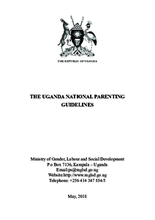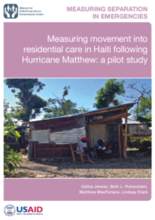Displaying 681 - 690 of 1510
The current study uses a culturally and contextually modified early adolescent version of the Home Observation for Measurement of the Environment Inventory (EA-HOME-JP) in Japanese child welfare institutions (CWIs) to provide preliminary data on relevant variables in the caregiving environment that associate with domains of perceived self-competency.
This article examines the care experiences of former looked‐after children from a residential care setting in South Africa.
These Guidelines are for all persons taking care of children. The goal of these Guidelines is to empower parents, the family and community structures to effectively nurture children so that they can realise their full potential.
This study from the Bucharest Early Intervention Project (BEIP) examines the brain electrical activity of children and young people who have been institutionalized.
The objectives of the study were to describe and study the extent of depression in adolescent boys and girls living in institutional homes and to study the association between depression and externalizing and Internalizing behaviors among adolescents in institutional homes.
The goal of this study was to explore the assets and pathways in pursuing the future goals of 25 care leavers in Israel.
Drawing upon in‐depth interviews with 12 parents of adolescent girls with multiple and complex needs in residential child welfare, this exploratory study describes parents' own needs and preferences with regard to care delivery.
The purpose of this study was to determine the feasibility of evaluating movement of children into residential care following an emergency.
In a contemporary context dominated by reports of the historical institutional abuse of children and young people in residential children's homes, and where the voice of workers is largely absent, this study explores the views and experiences of 26 workers in the Republic of Ireland regarding relationship‐based practice.
This study explores the views and experiences of 26 workers in the Republic of Ireland regarding relationship‐based practice.


